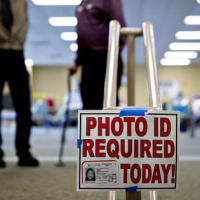Appeals Court Shores up Wisconsin Voter ID Law
 (photo: Daniel Acker, Bloomberg via Getty Images)
(photo: Daniel Acker, Bloomberg via Getty Images)
By Michael Wines, New York Times
A federal appeals court on Wednesday blocked a lower court from allowing voters in Wisconsin to cast ballots without photo identification, stating that the lower court had been too lenient in loosening a state voter ID law that had already been declared discriminatory.
The injunction (pdf), issued by a three-judge panel of the 7th U.S. Circuit Court of Appeals in Chicago, adds a new measure of confusion into a fierce battle over the 2011 law in a battleground state, three months before the presidential election.
But it did not affect a second federal court ruling in July that loosened Wisconsin’s photo ID law in a different manner: allowing any registered voter struggling to get one of the accepted forms of ID to obtain voting credentials at any state motor vehicle office. The July ruling also broadened the types of ID that college students can present at polling places.
The second ruling, which additionally struck down a host of other voting prerequisites as discriminatory, is also being appealed to the 7th Circuit. It was unclear when the court would rule on that challenge.
Nor was it clear whether the lower court judge, Lynn Adelman of the U.S. District Court in Milwaukee, would be able to fashion a change in the photo ID law that would meet the appeals court’s objection in time for the election in November.
“The election is looming, and everyone understands the importance of finality,” said Myrna Pérez, the deputy director of the democracy program at New York University’s Brennan Center for Justice. But “the timing is going to be very tight,” she added.
Gov. Scott Walker of Wisconsin, a Republican, called the appeals court injunction “a step in the right direction.” “Our administration will continue to work to make it easy to vote and hard to cheat,” he said.
But an official with the American Civil Liberties Union, which was a plaintiff in the lawsuit, said that there was still time to overturn an appeals court injunction that he called an “outlier” among recent voting-rights decisions.
“The decision is really out of step with other courts in the country that have considered voter ID laws,” said Dale Ho, the director of the ACLU’s Voting Rights project.
Wednesday’s injunction was a setback for voting rights advocates after a series of federal court rulings in recent weeks had effectively invalidated similar voter ID laws in Texas, North Carolina and North Dakota. In the Texas case, a federal district court on Wednesday accepted an agreement by both sides in the lawsuit that allows voters without an accepted form of ID to vote after signing an affidavit saying they could not reasonably obtain one.
Among other actions, that district court also rejected a request by Texas state officials to include language in the agreement stating that it was but an interim accord that could be changed later by the state Legislature.
The Wisconsin law, one of the more restrictive of dozens such laws nationwide, bars registered voters from casting ballots unless they possess one of eight photo ID cards, including a Wisconsin driver’s license, a state ID card, a U.S. passport, a military ID card, certain kinds of college student IDs, a naturalization certificate or a photo ID from a Native American tribe in the state.
Voting rights advocacy groups have long said — and some Republicans have agreed — that Republicans wrote the law largely to make it hard for traditionally Democratic voters, such as minorities and students, to cast ballots.
Adelman said in July that the law lacked a “safety net” for voters who had trouble obtaining one of the cards, and ordered Wisconsin to allow any registered voter lacking an ID to cast a ballot by swearing on an affidavit that he or she could not reasonably obtain one.
On Wednesday, the appeals court said that standard appeared too broad because even registered voters who had never tried to obtain an ID could vote by signing the affidavit. The three-judge panel issued the injunction after concluding that they were likely to strike down the order on appeal.
To Learn More:
Ruthelle Frank, et al., v. Scott Walker, et al. (U.S. Court of Appeals for Seventh Circuit) (pdf)
Seeing Intentional Effort to Suppress Black Vote, Judge Strikes Down Part of Wisconsin Voter ID Law (by Jack Bouboushian, Courthouse News Service)
State Courts Versus Republican Efforts to Limit Voting: Wisconsin (by Noel Brinkerhoff, AllGov)
- Top Stories
- Unusual News
- Where is the Money Going?
- Controversies
- U.S. and the World
- Appointments and Resignations
- Latest News
- Trump to Stop Deportations If…
- Trump Denounces World Series
- What If China Invaded the United States?
- Donald Trump Has a Mental Health Problem and It Has a Name
- Trump Goes on Renaming Frenzy






Comments